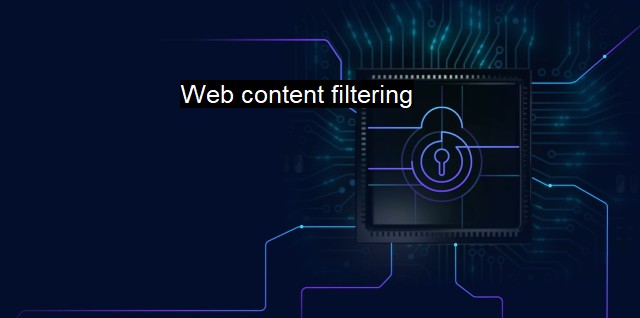What is Web content filtering?
Securing Your Network: Understanding the Importance of Web Content Filtering in Cybersecurity
Web content filtering is a crucial method implemented to exercise control over what content can be accessed over the internet. It is a technology used primarily by businesses, schools, and various organizations to limit and control the content that users can access based on a variety of factors including security, productivity, and legal issues.Typically, web content filtering functions by rating websites based on a variety of factors and then allowing or denying access based on pre-set criteria. The evaluation of websites can be based on many factors such as the origin of the site, the creators of the content, site reputation, and the presence of specific words, phrases, or images. It can also use a blacklisting approach where access to particular websites is blocked outright, or a whitelisting approach where only approved websites can be accessed.
Web content filtering supports significant security requirements in several aspects. For instance, it can help intercept the malicious payloads obtained from clicking on links communicated via phishing emails, or from unsecured or compromised websites, thus eliminating threats even before they reach the network. This consequently minimizes the risk of exposure to viruses, harmful code, malicious requests, and scamming attempts. It can also obstruct content that could be used in social engineering attacks, making it harder for cybercriminals to manipulate and mislead users and acquire sensitive information.
Yet beyond this method’s role of security-based rejection, web content filtering is also key in maintaining a sanctified online environment free from inappropriate or offensive materials within organisations. Typically, access to material deemed unacceptable is blocked, which may encompass adult content, gambling sites, or internet gaming portals.
Another significant value of web content filtering is reducing potential legal risks. It protects businesses, schools, and organizations from potential liabilities linked with permitting access to offensive content, thereby aiding in securing legal compliance. By monitoring and controlling the type of online media that users can access, organizations can also manage unsuitable usage of business networks and avert copyright infringement related to downloading unlawful content.
Web content filtering can impact productivity positively, too; by limiting employee access to recreational or distractive websites, enterprises can assure the efficient use of work time. This component can be particularly beneficial when managing remote staff, as home networks may lack the pre-existing infrastructure to prevent outflows in productivity effectively.
While web content filtering offers many security and productivity benefits, the accuracy degree isn't always consistent, nor is it foolproof. For instance, some legitimate websites could get categorically or inadvertently blocked, or individual malicious sites could elude notice and sidestep the filter. Therefore, businesses and organizations need an overarching cybersecurity strategy and should not depend solely on web content filtering.
Having a robust antivirus solution is critical to protecting network integrity and sensitive information. Antivirus software can scan, identify, and help ongpin cyber threats like viruses, proxy servers, and worms that may be attempting to breach the system. Detecting such threats can prevent damages such as data corruption or loss, identity theft, and disruption of operations.
Web content filtering's value in cybersecurity and antivirus activities rests in its potential to block unsafe internet content access and protectively facilitate netizens' online navigation. This process not only ensures protection against potential cyberattacks but also enhances productivity and compliance with legislations concerning appropriate content use. Combining content filtering with a formidable antivirus system can bolster an organization's cybersecurity landscape, producing a layered approach to security and helping create a more robust and safer browsing environment.

Web content filtering FAQs
What is web content filtering?
Web content filtering is a cybersecurity technique that involves restricting or blocking access to certain websites, web pages or web-based applications. It is commonly used to prevent access to harmful or inappropriate content, malware or viruses.How does web content filtering work?
Web content filtering works by examining network traffic and comparing it against a set of predefined criteria, such as URL, IP address, domain name, or content type. If the traffic matches any of the criteria, it is either allowed, blocked or redirected based on the organization's security policies.Why is web content filtering important?
Web content filtering is important because it helps prevent cyber threats like malware and viruses from entering your network through web-based applications or websites. It also helps organizations enforce acceptable use policies, ensure compliance with regulations and protect against legal liabilities.What are the benefits of using web content filtering?
Some benefits of using web content filtering include reducing the risk of cyber attacks, improving employee productivity, mitigating legal and regulatory risks, and protecting your network reputation. It also helps in preventing data breaches and protecting sensitive information.| | A | | | B | | | C | | | D | | | E | | | F | | | G | | | H | | | I | | | J | | | K | | | L | | | M | |
| | N | | | O | | | P | | | Q | | | R | | | S | | | T | | | U | | | V | | | W | | | X | | | Y | | | Z | |
| | 1 | | | 2 | | | 3 | | | 4 | | | 7 | | | 8 | | |||||||